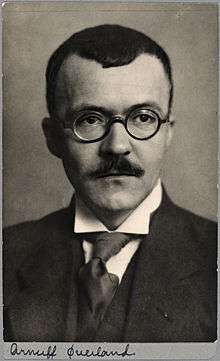Arnulf Øverland

Ole Peter Arnulf Øverland (27 April 1889 – 25 March 1968) was a Norwegian poet born in Kristiansund and raised in Bergen. His works include Berget det blå (1927) and Hustavler (1929).
Life
Øverland was a communist from the early 1920s, but changed his stand in 1937, partly as an expression of dissent against the ongoing Moscow Trials. He was an avid opponent of Nazism and in 1936 he wrote the poem "Du må ikke sove" ("Dare not to sleep!") printed in the journal Samtiden.[1] It ends with "Jeg tenkte: Nu er det noget som hender. Vår tid er forbi - Europa brenner" ("I weighed: Something is imminent - and it’s dire Our era is over — Europe’s on fire!"). The probably most famous line of the poem is "Du må ikke tåle så inderlig vel den urett som ikke rammer deg selv!" ("You must not tolerate so well the injustice that doesn't affect you yourself!")
In 1933, Øverland was tried for blasphemy after giving a speech named Kristendommen - den tiende landeplage ("Christianity - the tenth plague"), but was acquitted.
During the German occupation of Norway from 1940 in World War II, he wrote a series of poems which were clandestinely distributed, leading to the arrest of him and his wife Margrete Aamot Øverland. Arnulf Øverland was held first in the prison camp of Grini before being transferred to Sachsenhausen concentration camp in Germany.
The poems were later collected in Vi overlever alt ("We survive everything") (1945).
After the second world war, Øverland became a noted supporter for the conservative written form of Norwegian called Riksmål, he was president of Riksmålsforbundet (an organization in support of Riksmål) from 1947 to 1956, playing an important role in the Norwegian language struggle in the post-war era.
In addition, Øverland adhered to the traditionalist style of writing, criticising modernist poetry on several occasions. His speech Tungetale fra parnasset, published in Arbeiderbladet in 1954, initiated the so-called Glossolalia debate.[2]
| “ | What can you own, when life itself is a loan? | ” |
Works
(not a complete list)
- Den ensomme fest (1911)
- Den røde front (1937)
- Vi overlever alt (1945)
- Sverdet bak døren (1956)
- Livets minutter (1965)
Awards
(not a complete list)
- Gyldendal's Endowment for 1935
- Dobloug Prize for 1951
- Mads Wiel Nygaards legat for 1961
References
- ↑ Øverland, Arnulf (1936). Jac. S. Worm-Müller, ed. "Du må ikke sove!". Samtiden (in Norwegian). 47: 318–320.
- ↑ Dahl, Willy (1989). "Tungetale-debatten". Tid og tekst 1935–1972. Norges litteratur (in Norwegian). 3. Oslo: Aschehoug. pp. 157–159.
- Hjeltnes, Guri (1995). "Øverland, Arnulf". In Dahl, Hans Fredrik. Norsk krigsleksikon 1940-45. Oslo: Cappelen. Retrieved 2008-09-11.
External links
- "Du må ikke sove!" (Norwegian)
- Translation of "Du må ikke sove" by Lars-Toralf Storstrand
- Kristendommen, den tiende landeplage (Norwegian)
- Christianity, the tenth plague